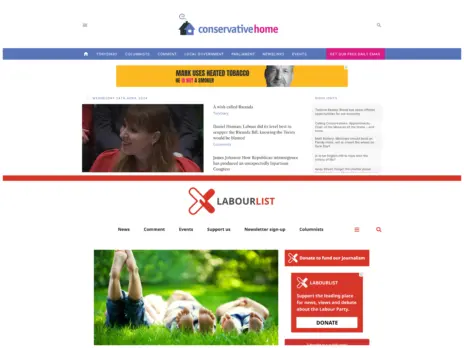
“It’s really great that there’s a group of female journalists working together to help support others,” says Buzzfeed UK investigative reporter Jane Bradley, who is a mentor in a scheme supporting women journalists in the early years of their careers.
“It’s better, not just for women in the industry, but journalism as a whole when you’ve got women helping each other out rather than being competitive about it,” she tells Press Gazette.
Bradley, a former BBC producer, is part of a scheme by female journalism outfit The Second Source – set up in the wake of the #MeToo movement to tackle harassment in the news media – that has matched more than 100 young women with more experienced mentors.
The scheme aims to support women in the early stages of their journalism careers – those who have been professional journalists for five years or less – by providing help and advice.
It focuses especially on helping women who have experienced harassment, who are considering dropping out of the industry, or who feel they need more direction.
Bradley is mentor to Linh Nguyen, who works for community-driven news platform Wikitribune, launched by Wikipedia founder Jimmy Wales.
Nguyen, from south east London, says she became a journalist partly because of the Grenfell Tower fire disaster in London in June last year, which killed 72 people.
The news media faced accusations that it was out-of-touch after failing to pick up on safety warnings from residents in the weeks before the fatal fire.
“I realised there was a yawning gap between the public and the media,” says Nguyen.
She applied for The Second Source mentorship scheme after colleagues at work suggested it would be beneficial to her career as a working class woman of colour – Nguyen has Vietnamese heritage.
She says: “In the UK, the media is quite classist… where I come from, part of the reason we don’t trust the media is because there aren’t enough people to represent who British people actually are.”
The Second Source, founded in November last year by 20 women journalists, particularly encouraged journalists to apply to the scheme if they were from currently underrepresented communities in terms of race and class.
Nguyen says The Second Source is “inclusive”, “diverse,” and “does try to understand people’s backgrounds and give them a chance at life”.
She says of diversity in the media: “You can’t be what you can’t see.”
Bradley says in the beginning of her own career she felt like an “impostor”, having come from a working class family in Hull, without a degree, into the prestigious BBC Trainee scheme.
Nguyen recognises this feeling of “impostor syndrome” too, and says when mentees were asked at an induction for the scheme to list what they wanted to improve on “they all wrote down confidence”.
“The importance of confidence” is a quality that Bradley has already identified as key for young women journalists, but she says her main advice to women starting out in the industry is to “come up with ideas”.
She says: “Journalists who’ve been doing it for thirty years or so expect the stories to come to them.
“If you go out there, if you hunt for stories, and you’re confident and you know who to pitch it to, that’s going to make you stand out a mile, and having ideas is nothing that your age or inexperience can stop you doing.”
Some of Bradley’s most recent work for Buzzfeed has been investigating the prosecutions of vulnerable women in the UK who have made false claims about rape. Nguyen covers international politics, technology, privacy and social issues in her work for Wikitribune.
Both are enthusiastic about The Second Source’s anti-harassment stance.
“We’re much more powerful when together than alone,” Bradley says. “It just feels like suddenly women are being listened to… organisations everywhere, not just the media, are sitting up and thinking ‘ok, we actually have to do something about this’.”
Both mentor and mentee are alive to the need for “tackling the silence” around inequality and harassment in the industry, and can recount instances of workplace harassment they themselves have experienced.
Bradley says she has never been harassed while working as a paid, professional journalist, but remembers an incident that took place when she was a young intern.
“I was a 19-year-old intern and a much older exec basically said he would fire me if I didn’t go for a drink with him,” she says, telling Press Gazette she “walked out that night and never came back”.
But, she adds, if it had been a paying job in a “proper newsroom” then a similar situation “would be much harder, especially for young and poor aspiring journalists, to walk away from”.
Bradley says throughout her professional journalism career she has been “lucky” to have worked with “brilliant colleagues and editors”.
Nguyen says she has faced comments such as “that’s a nice ass” from colleagues – though she did not specify where – while another had once joked that she should “sit on his lap”.
She says harassment makes her feel “undermined” as a professional, and affects women at work, making them “less creative” and “demotivated and dispirited” in what she calls a “negative ripple effect”.
“I think you shouldn’t stay silent [about harassment], to let other women know that they’ve not been alone,” she says.
The Second Source’s co-founder, BBC journalist Kirstie Brewer, said the mentoring scheme was set up as a support network to “keep promising, brilliant young women from becoming disillusioned with what can be a tough industry”.
The Second Source offers career advice to mentees through emails and events.
Says Bradley: “Even with the progress made and the #MeToo movement, women do clearly need that bit of extra support to be getting that recognition and getting the jobs and getting the pay that they deserve.
“I think this goes some of the way to addressing that.”
Picture: The Second Source
Email pged@pressgazette.co.uk to point out mistakes, provide story tips or send in a letter for publication on our "Letters Page" blog






